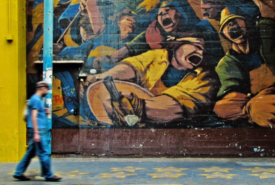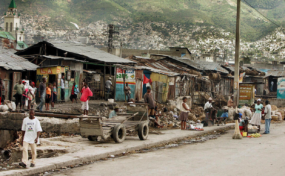Posted on 03 Nov 2021
In a series of recent meetings, the Commission on Narcotic Drugs identified state challenges in tackling drug trafficking, but glossed over the broader issues shaping the global drug economy and how to foster a more coordinated and multi-stakeholder response through the UN system.
Between 19 and 21 October, the Commission on Narcotic Drugs (CND) met at the UN Office on Drugs and Crime (UNODC) in Vienna to discuss issues of transnational organized crime, specifically the links between drug trafficking and other crimes, challenges in tracking and seizing the proceeds of crime and online drug trafficking. Notably, the meetings marked a return to an in-person format, albeit with masks, social distancing and COVID-19 access requirements.
With such face-to-face meetings a rarity since her January 2020 appointment, UNODC Executive Director Ghada Waly duly seized the chance to address the opening session. Calling upon her organization’s accredited ambassadors and diplomats ‘to reflect on the big picture [and] how this Commission can help target the criminal structures that sustain drug trafficking,’ the executive director clearly wanted member states to rectify the lack of analysis of illicit drug markets that marked this year’s main CND meeting in May, during which the committee had instead focused on the health impacts of drugs and the ongoing political debate around cannabis classification.
But her call fell on deaf ears. Throughout the October meetings, there was little analysis of the criminal economy around drug markets, while the bigger picture of how illicit drug economies thrive was not addressed in any detail. Instead, the presentations and discussions were state-centric, focusing on the latest research and perspectives from the UNODC and some member states, the challenges states face in law enforcement and criminal justice responses and the need for more effective international cooperation between states to address these challenges.
There was little discussion around how to explore joint efforts with other parts of the UNODC mandate, or indeed the wider UN system, despite Waly’s argument that the meeting represented a ‘unique opportunity to explore joint and complementary efforts in the substantive work’ of the CND and the Commission on Crime Prevention and Criminal Justice (CCPCJ), the CND’s sister commission, which will hold its first meeting on 10–12 November.
Neither was there much recognition among member states over the need to enhance cooperation between states and civil society, although several civil society panellists were vocal on the issue. Tariq Khosa, director of the Centre for Governance Reform (Pakistan) and a former senior law enforcement official, made a strong case for greater civil society involvement and the importance of community resilience in countering organized crime:
I represented the Government of Pakistan as Head of Delegation to the CND in Vienna in 2010 as the Federal Secretary of Narcotics Control…. Working within the government, we strongly felt that without developing community resilience and making civil society as active partner, the state alone cannot combat the menace of illicit drug trade, corruption and associated organized crimes…. So, the first lesson that we have drawn is for the society and state to forge an effective partnership in tackling the challenges of organized crimes.
Khosa’s call for civil society engagement was subsequently supported by the Ambassador of Mexico and the delegation of Canada in ensuing discussions, showing some member state support for this position.
Another civil society intervention came from John Collins, Director of Academic Engagement at the GI-TOC, who highlighted the big picture impacts of illicit financial flows in the Western Balkans and East and southern Africa (two regions on which the GI-TOC has published research) and concomitant need for civil society inclusion:
Our regional examples are illustrative of the global and local effects on development and security of illicit financial flows related to the drugs trade – poverty, violence, drug addiction and health impacts, and a general breakdown in good governance. The response not only lies in the seizure of drugs and money, but a holistic response including the prioritization of urban security, support for community resilience and including civil society voices at all stages.
All in all, the CND sessions were a useful platform for exchange between states and civil society, and a welcome return to more in-person engagements, which can facilitate better international cooperation. Civil society played their role in providing some alternative viewpoints and new perspectives, and therefore added value to the proceedings[1].
But while the discussions succeeded in identifying key issues and challenges for states in mobilizing their responses, states once again avoided analysis of the criminal economy of drug markets. As such, Waly’s stated hope for the meeting – that ‘the Commission can foster political momentum [to] address the criminal economy that surrounds the illicit drug market’ – looks likely to remain unfulfilled.
Other transnational organized crime-related multilateral activity
First meeting of the CCPCJ
Between 10 and 12 November, the CCPCJ has its first meeting, following up on the 2021 Kyoto Declaration from the 14th UN Crime Congress. Given the sessions’ focus on the causes of crime, the economic dimension of crime and gender and youth issues, there is scope, again, to address the political economy of illicit markets, while criminal economy analysis and coordination between the CND and CCPCJ (as well as the broader UN system) on organized crime issues should also be addressed by member states.
OSCE’s focus on transnational organized crime
The Organization for Security and Co-operation in Europe (OSCE) continues its increased focus on transnational organized crime, following the landmark 2021 Tirana Ministerial Declaration on Transnational Organized Crime, in which the participating states agreed on the need to focus on civil society engagement and building community resilience to organized crime. Transnational organized crime has been discussed recently at the OSCE’s Security Committee, the OSCE-wide Drug Conference, Asian Conference, a Mediterranean Partners for Co-operation Group meeting and the Annual Police Experts Meeting – all of which were addressed by the GI-TOC.
Cybercrime
Member states in Vienna have submitted their ideas on the agenda and modalities of the Ad Hoc Committee that will negotiate a new UN instrument on cybercrime, ahead of its first meeting in January 2022 in New York. All submissions can be read here.
UN General Assembly Third Committee
In a parallel process that sometimes takes Vienna-based diplomats by surprise, their counterparts at the UN General Assembly Third Committee in New York negotiate ‘omnibus’ resolutions covering the mandates of the UNODC. While usually sticking to the positions agreed in Vienna, they always have the potential to add new nuances or issues to ongoing processes in Vienna. Cybercrime will be in issue to watch in the negotiations this year, as Vienna prepares to finalize the modalities for a process that straddles the bailiwicks of Vienna- and New York-based diplomats.
UNTOC review mechanism
The review mechanism of the UN Convention against Transnational Organized Crime continues to make slow progress, with less than half of countries selected to be reviewed in the first cycle having nominated their focal points to start their review. For an overview of how states and civil society can engage with each other on the review, read here.
[1] Another contribution from civil society on relevant issues was published in the same week: ‘The future of international cooperation against transnational organized crime,’ a new GI-TOC paper written by colleagues from the International Center for Criminal Law Reform, analyzes the politics behind the challenges identified by member states in their responses to organized crime.



